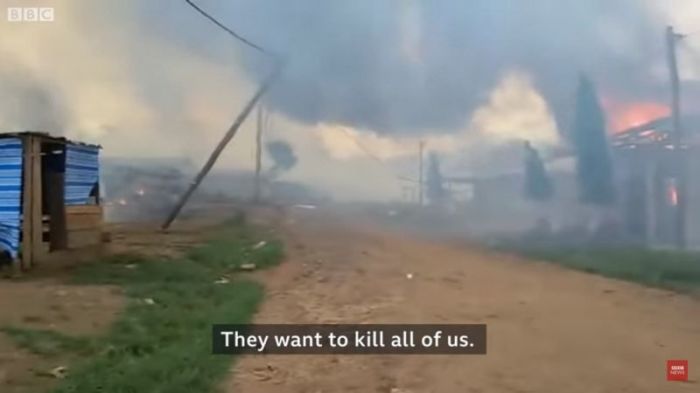Cameroon: Over 2,000 Killed, 170 Villages Burned as Military Seizes Churches

Over 2,000 people have been killed and 170 villages burned in English-speaking regions of Cameroon which has halted some Bible translation efforts, a Christian leader has warned.
Violence has escalated in Cameroon's Anglophone regions in the last 18 months, with reports of French-speaking state forces launching a string of random attacks, kidnappings, and rapes against English-speaking residents and their villages in Western Cameroon.
After English-speaking residents in the Northwest and Southwest regions protested in October 2016 demanding autonomy because they feel underrepresented in the government, violence in those communities escalated throughout 2017.
Last month, the United Nations expressed concern that the violence against those communities has only "worsened considerably" since 2017 as there have been multiple reports of detention, torture, burning down of homes and excessive use of force by state forces.
The U.N. estimates that about 21,000 people have fled to neighboring countries, while 160,000 have been internally displaced by the violence. Many are hiding in the forest.
In a recent interview with Mission Network News, Efi Tembon, the executive director of the Cameroon Association for Bible Translation and Literacy, described the state of the country.
"More than 2,000 people have been killed so far since this started, and more than 170 villages have been burned, and more than 200,000 people are displaced, and more than 100,000 people are refugees in Nigeria," he said.
Additionally, Tembon said that the military has even killed some pastors and taken over churches to use them as military bases.
Tembon said that there are 38 Bible language projects or projects helping communities with "scripture impact" that have been impacted by the violence.
The violence has caused many of the 400 translators in the regions to be displaced. Many of them are hiding in forests and some have been killed.
"In some communities translation has stopped," Tembon said.
As for the thousands of people who have fled into the forests, Tembon expressed concern for their well-being.
"There are more people dying in the bushes than [who] are even being killed by bullets because they have no access to medical care," he explained. "They are sick with Malaria. ... Children are dying of malnutrition, [and] they don't have any food."
Many of those who fled don't even have a home to return to, Tembon stressed.
"Their homes have been burned, family members killed, they are living in bushes without food, no clothing, no basic needs, [and] exposed to all kinds of danger," he said.
Tembon warned that the Cameroonian military has, over recent years, received support and training from the U.S. government.
"This provision was for the fight against Boko Haram. It was well-intentioned, but you know with good intentions, sometimes they have unintended consequences," Tembon said. "These are being used now to fight against the ... people."
"We think the U.S. has leverage, has some influence to be able to help," Tembon added. "We are calling on others to write to their senators, to write to their representatives to be aware of this situation so something can be done [and] mediation can take place so peace can return."
U.N. High Commissioner for Human Rights Zeid Ra'ad Al Hussein urged the Cameroonian government to start an independent investigation into the reports of human rights abuses.
"Given the seriousness of the reports of violence against Cameroonians in the western part of the country, we have asked for access to be able to verify allegations made against both security forces and armed elements," Zeid said in a statement. "We will now need to explore other options, including remote monitoring."
According to Mission Network News, the interdenominational Bible translation nonprofit Wycliffe Associates, a partner of Tembon and CABTAL, is raising funds to provide for the displaced Bible translators and to replaced translation equipment.




























